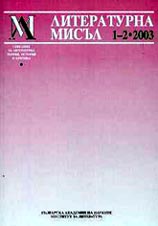Баснята за блудния син: Гео Милев, европейският модернизъм и българската лява критика
The Fableof the Prodigal Son: Geo Milev, European Modernism, and Bulgarian Left Criticism
Author(s): Nikita NankovSubject(s): Literary Texts
Published by: Институт за литература - БАН
Keywords: Milev; left criticism; modernizm; Plamuk (Flame)
Summary/Abstract: Geo Milev (1895–1925) is one of the most erudite, versatile, controversial, and enigmatic Bulgarian modernists. He is a poet; translator fluent in several European languages; literary, art, theater and music critic; illustrator; theater director; and editor of two of the most radical modernist magazines in Bulgaria–Vezni (Scales) and Plamuk (Flame). This study explores how Bulgarian Left criticism, from the mid 1930s to the end of the 1980s, interpreted Milev by means of the narrative of the Biblical prodigal son. Milev (and his Bulgarian modernist peers) are portrayed and interpreted by a story consisting of three stages: from 1913 to 1914 Milev created realistic art; then, from 1914 to 1922, he was interested only in modernism in the form of Symbolism, Expressionism, and avant-garde, and his greatest sin as a writer is that he avoided the burning social issues of his time; and, finally, from 1922 to 1925 Milev again shifted to realism in art that now, due to his newly acquired Marxist-Leninist worldview, made him a socialist realist and a poet whose martyr’s death elevated him to the Pantheon of Bulgarian literature. The essay critically outlines several aspects of the interpretive narrative about Milev: first, the story of Milev as a prodigal son is an ideological and teleological verbal construct; next, the critical fable of Milev as a repenting modernist has two forms–a detailed and short one which are used in different periods of Bulgarian cultural history; then, the narrative of the prodigal son is a form of the aesthetics of realism, whereas philosophically it bears some major resemblances with Cartesian idealism; next, rhetorically, the fable of Milev is rendered by means of metaphors of the path, whereas in terms of poetics the narrative is told always chronologically. The analysis concludes by sketching five corollaries of the narrative about Milev as a prodigal son that, in one form or another, can be perceived in Bulgarian culture down to this day.
Journal: Литературна мисъл
- Issue Year: 2003
- Issue No: 1-2
- Page Range: 85-111
- Page Count: 27
- Language: Bulgarian
- Content File-PDF

